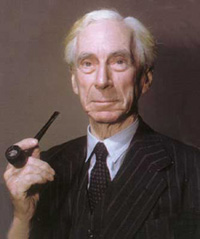
Your complimentary articles
You’ve read one of your four complimentary articles for this month.
You can read four articles free per month. To have complete access to the thousands of philosophy articles on this site, please
News
News: June/July 2016
Bertrand Russell Society Gives This Magazine a Pat on the Back • News about Death • News from Scandinavia — News reports by Anja Steinbauer
Philosophy Now Wins Bertrand Russell Society Award

The Bertrand Russell Society has announced that this year it will give its annual Award to Philosophy Now magazine “which is celebrating its 25th anniversary in 2016 and which has ably followed in the Russellian tradition of encouraging philosophical inquiry in a popular manner.”
Philosophy Now Editor Rick Lewis will accept the award on behalf of the magazine at the society’s 2016 Conference, which will be held at St John Fisher College in Rochester, New York on 24-26 June.
The Bertrand Russell Society (visit bertrandrussell.org) is an international society dedicated to the memory of the philosopher and logician. Its annual Award, established in 1980, has previously been given to such colossi of cogitation as Popper, Quine, Dennett and Dawkins. Last year in Dublin it was presented to the philosopher A.C. Grayling.
Throw the Switch Now, Igor!
Bioquark Inc., a US biotechnology company, has been granted permission by the Institutional Review Board at the National Institutes of Health in the USA and India to experiment on twenty clinically dead patients trying to bring their central nervous systems back to life.
If they can successfully resuscitate regions of the upper spinal cord near the lower brain stem they might be able to kickstart vital body functions such as breathing and heartbeat.
Once permission from the families has been obtained, the researchers will treat their clinically dead patients over six weeks in Anupam Hospital in Rudrapur, India, followed by several months of close monitoring possible changes.
Founder and president of Bioquark, Sergei Paylian comments, “Through our study, we will gain unique insights into the state of human brain death, which will have important connections to future therapeutic development for other severe disorders of consciousness, such as coma, and the vegetative and minimally conscious states, as well as a range of degenerative CNS conditions, including Alzheimer’s and Parkinson’s disease.”
(Near) Death Experiences
What is it like to die? Sam Parnia, the director of resuscitation research at Stony Brook University School of Medicine, has undertaken the largest study to date on resuscitated patients working towards a fuller understanding of the experience of dying. Parnia published his findings in the journal Resuscitation. Having interviewed 100 people brought back to life after fatal cardiac arrests he found that almost half had some memory of their deaths. Parnia structured the results according to seven broad categories: fear; seeing animals or plants; bright light; violence and persecution; déjà vu; seeing family; and recalling events post-cardiac arrest. As the categories suggest, it turned out that individual experiences are much more diverse than previously believed, ranging from positive to negative.
Young Philosopher of Mathematics
Stefan Buijsman, Sweden’s youngest PhD, is a celebrity – and a philosopher. The 20 year old finished school at 15, and received his master’s degree in philosophy at 18. Most recently, at the age of 20, he has completed his PhD in the philosophy of mathematics: “I’m looking at how we learn maths – and trying to understand what it is. Is maths about anything real, or is it just something we’ve been making up for 3,000 years?” Buijsman’s research focussed on how non-mathematicians use maths in everyday activities such as shopping. He found that no theories in the philosophy of mathematics can be applied to how ordinary people use maths: “This means some people are making it all more complicated than it needs to be – and we don’t have a good understanding of how people learn maths.” Buijsman is happy to put his fame in the service of his subject: “It’s been great, because you don’t normally see philosophy in the news! And not many people have heard of the philosophy of mathematics.”
Danes Say No to Farty Cows
With cattle contributing a tenth of global emissions of greenhouse gases, people are ethically obliged to change their eating habits, claims the Danish Council on Ethics (Det Etiske Råd), an influential government think tank.
Their report notes that food production causes between 19 and 29 percent of global greenhouse gas emissions, but that cattle alone account for 10 percent. It concludes from this that “climate change is an ethical problem” and argues that Danish citizens are ethically obliged to change their eating habits, emphasising that it is unproblematic to remove beef from one’s diet without compromising healthy eating.
The Council on Ethics has therefore recommended a special tax on beef, with the option of extending the regulation to all red meats in future. This may be the initial stage of a development towards taxing all foods at varying levels depending on their environmental impact.
In a press release, the ethics council said: “The Danish way of life is far from climate-sustainable, and if we are to live up to the Paris Agreement target of keeping the global temperature rise ‘well’ below 2°C, it is necessary both to act quickly and involve food.”









